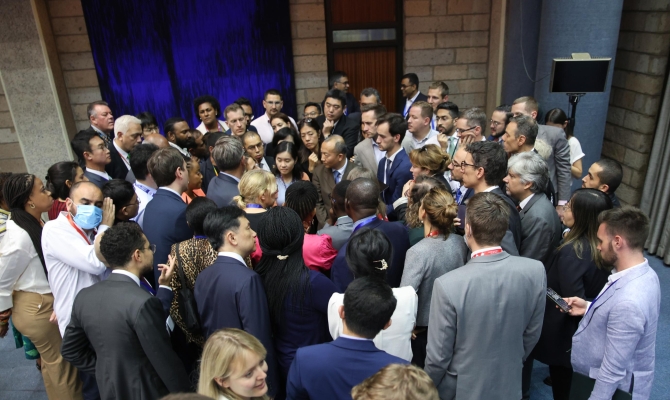Pacific delegates who attended the third session of the Intergovernmental Negotiating Committee to develop an international legally binding instrument on plastic pollution, including in the marine environment (INC-3), in Nairobi Kenya, are returning home reasonably satisfied with the progress made during the past week.
Although some will argue that the outcome could have been better, others among Pacific delegations say it is better to tread carefully and move slow than falling for a bad deal on an issue where Pacific countries are placed at the forefront of the plastic pollution crisis despite having very little to contribute to it.
Negotiators from 14 Pacific countries took part in a week of intense, complex negotiations which ended after midnight on Sunday in Nairobi. In three contact groups, negotiators pored over dozens of member submissions and statements in addressing the six parts of the zero draft document released after INC-2. They went through a compilation of text to include all the views of Members, prepared a validated, co-facilitator merged text, and found a way forward on issues not discussed as yet.
But the primary sticking point was the question of: Whether to manage plastics pollution from the “bottom up” — making nations responsible for environmental clean-up and costs — or mandate a stricter approach that clearly limits or bans production of “problematic” and hard-to-recycle plastics.
The Executive Director of the UN Environment Programme (UNEP), Inger Andersen, said she is encouraged by the forward motion of the negotiations and encouraged more than 1,900 delegates to continue to be ambitious, innovative, inclusive, and bold.
“We must use these negotiations to hone a sharp and effective instrument that we can use to carve out a better future, free from plastic pollution,” she said.
Palau, as the PSIDS Chair, with support from the Secretariat of the Pacific Regional Environment Programme (SPREP), had been coordination meetings for all Pacific delegates to help them with the negotiations.
“The modern world is addicted to plastic. This is a fact. The first step to stop addiction is to admit there is a problem. We did that with UNEA 5/14. Now is the time to set the plan: quit the addiction, change our habits, and clean up,” the PSIDS Chair, Palau, told the gathering representing 161 Members, including the European Union and over 318 observer organisations – UN entities, intergovernmental organisations, and non-governmental organisations.
“This is why this instrument must address the full lifecycle of plastic: with measures applicable to upstream, midstream and downstream stages, including legacy plastics.”
The Pacific Islands were represented by the Cook Islands, Federated States of Micronesia, Fiji, Kiribati, Marshall Islands, Nauru, Niue, Palau, Papua New Guinea, Samoa, Solomon Islands, Tonga, Tuvalu and Vanuatu through the support of the Government of Australia and the United Nations.
Samoa, as the Chair of the Alliance of Small Island States (AOSIS), was also very active in the process, facilitating daily coordination meetings at the negotiations for its member states.
“The instrument must prescribe appropriate processes to allow for the use of best available data, science and information, and traditional knowledge, knowledge of indigenous peoples and local knowledge systems, to help inform the compilation of annexes, the development of timetables, and the regulatory actions required. These processes must include relevant assessments on implications for SIDS,” Samoa, as AOSIS Chair, urged the negotiations.
“The design of regulatory interventions must take into account the availability of safe, accessible, efficient, economically feasible, environmentally friendly and sustainable alternatives, as well as the possibility of cooperating and/or coordinating with existing relevant frameworks or conventions which cover the relevant substances.”
SPREP’s Director of Waste Management and Pollution Control, Anthony Talouli, said the Pacific presence at INC-process continues to grow from strength to strength and SPREP looks forward to continuing to support the organisation’s Member countries.
“Negotiation spaces are never easy and we have once again witnessed that in Nairobi this week. They can be arduous, consist of long days, sleepless nights and sometimes it feels like we are not really moving anywhere but this the reality. We have to be at the table otherwise our Pacific Voice will be ignored and forgotten,” said Talouli.
“SPREP is extremely grateful to all our Pacific members who put in the long hours and the commitment for the sake of our Pacific communities’ back home. SPREP would also like to acknowledge the Government of Australia for its support towards the INC work already done and in moving forward.”
The stage is now set for the fourth Intergovernmental Negotiating Committee (INC-4) in Ottawa, Canada, in April 2024, and INC-5, which is scheduled for November/December 2024 in the Republic of Korea.
The INC also elected two Vice-Chairs to the Bureau and a new Chair of the Committee, Ambassador Luis Valdivieso of Ecuador. As indicated at INC-1, Gustavo Adolfo Meza-Cuadra Velasquez stepped down from the position as the Chair of the committee at the end of INC-3; Ambassador Luis Vayas Valdivieso of Ecuador was elected by acclamation as INC Chair moving forward.
Officially closing the session, outgoing Chair of the INC, Gustavo Adolfo Meza-Cuadra Velasquez, thanked the Government of Kenya and the UN in Nairobi for hosting the session.
“These past 10 days have been a significant step forward towards the achievement of our objective to develop an international legally binding instrument to end plastic pollution,” he said. “But it has also recalled us that much remains to be done both in narrowing down our differences and in developing technical work to inform our negotiations.”
The third Intergovernmental Negotiating Committee to develop an international legally binding instrument on plastic pollution, including in the marine environment (INC-3) is taking place in Nairobi Kenya from 13 – 19 November 2023.
SOURCE: SPREP/PACNEWS













